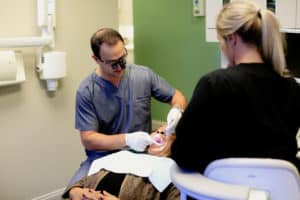February 6, 2017
According to the Centers for Disease Control and Prevention (CDC), half of all adults over the age of 30 have gum disease. We’d like to change that statistic by educating you on periodontal disease and how it’s treated in our office.
What Is Periodontal Disease?
In its mildest form, we refer to periodontal disease as gingivitis. At this stage, gums are often swollen or inflamed. Patients with gingivitis may experience bleeding gums during or after daily brushing. When gingivitis is caught early, it’s reversible with changes in your home care. That means brushing gently but thoroughly twice a day for 2 minutes each time and flossing at least once per day.
If left untreated, gingivitis can become far more serious, developing into periodontitis. When this occurs, gums start to separate from the teeth, forming deeper pockets. These pockets become infected, destroying surrounding bone and gum tissue.
What Causes Periodontal Disease?
The bacteria found in dental plaque causes periodontal disease. However, your likelihood of developing the disease is increased by the following risk factors:
- Genetics
- Smoking
- Misaligned or crowded teeth
- Stress
- Fluctuating hormones
- Prescription medications that dry out the mouth
- Certain diseases like diabetes
- Poor nutrition
How Do I Know If I Have Periodontal Disease?
The best way to know if you have periodontal disease is to visit a dentist for an evaluation. However, some common signs of the disease that you can look for at home include:
- Swollen, puffy, or bleeding gums
- Receding gumlines
- Gums that have pulled away from the teeth
- A change in the way your teeth fit together when you bite down
- Pus between the teeth and gums
- Constant bad breath or a bad taste in the mouth
If you are experiencing any of these symptoms, we encourage you not to delay seeking treatment. Gum disease in its earliest stages is reversible. However, as it advances, it begins to do irreversible damage.
Why Should I Be Concerned about Periodontal Disease?
Unfortunately, a strong link has been found between your oral health and other health issues. Periodontal disease has been associated with diabetes complications, as well as an increased risk of heart disease, stroke, cancer, osteoporosis, and respiratory disease.
What Can Petry & Walton Dental Do to Treat Periodontal Disease?
Doctor Petry and Doctor Walton are skilled dentists with years of experience and thousands of continuing education hours between them. By visiting us for regular dental checkups, you can vastly minimize your likelihood of developing periodontal disease.
During your dental appointment with us, we’ll thoroughly clean the root surfaces of your teeth at the gum line to remove plaque and tartar buildup. Regular dental checkups—coupled with good at-home dental care—will keep your oral health at its best and help prevent periodontal disease.
Speaking of those appointments, are you due for a checkup? If so, it’s easy to schedule an appointment with Dr. Petry or Dr. Walton. You can request one online, simply by clicking here or by calling our office at 330.434.3485. We are conveniently located at 508 E. Exchange Street in the heart of Akron.



